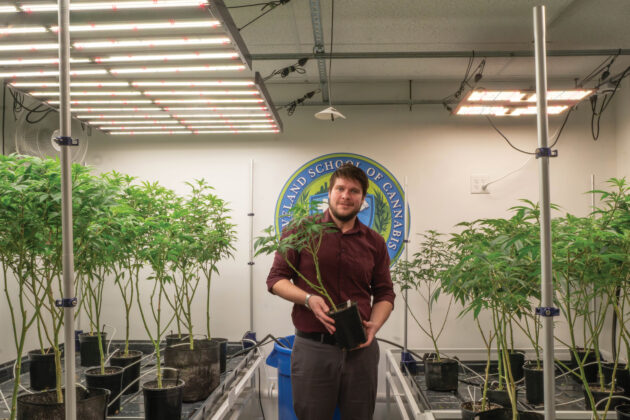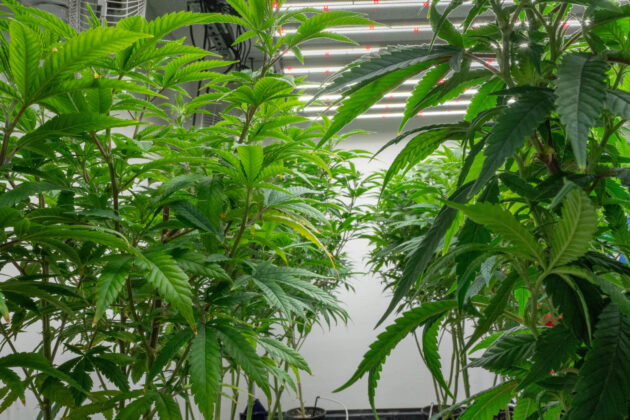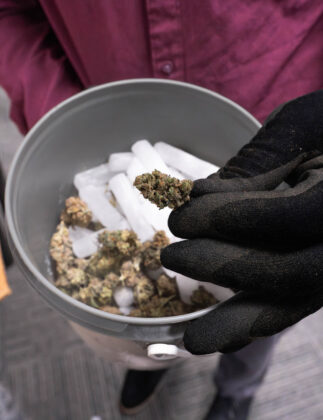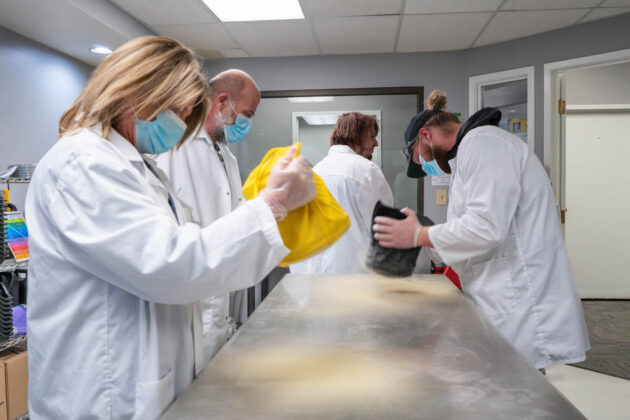
CLEVELAND — Everybody at the Cleveland School of Cannabis has a story, a personal reason, as to why they got involved in the cannabis industry.
For Randall Jenkins, professor of cannabis cultivation at the Cleveland School of Cannabis, it was his grandfather. His grandfather never wanted to use cannabis, but when he was diagnosed with cancer for the second time, his pain relief options were limited. In the last two months of his life, the peace cannabis provided him was immense.
“Usually after chemo, he’d sit in a room, not talk to anybody, just stare at the wall. (That evening) he hit a joint, sat down and ate dinner with his family,” Jenkins said. “It’s not a cure-all, in my opinion, but it could be a help-all.”
Ohio residents voted to legalize adult-use cannabis with the historic passing of Issue 2 in November. The legislation will allow Ohio residents over the age of 21 to buy cannabis products and grow plants at home.
Now, higher educational institutions across Ohio like the Cleveland School of Cannabis and Kent State University are offering cannabis education as a way to prepare residents for the emerging industry.
Marijuana was first declared illegal in the United States in 1937. In 1996, California became the first state to legalize marijuana for medicinal purposes. This extensive interval in time has led to a huge knowledge and research gap on the cannabis plant.
For the Cleveland School of Cannabis and others, Issue 2 is just the start of discovering the untapped potential of cannabis — potential that could have implications for Ohio’s health and wellness and agriculture industries.

Regulation
Under Issue 2, any Ohio residents over the age of 21 will be able to buy cannabis and grow up to six plants per individual and 12 plants per household. Now Ohio is tasked with developing regulations around legal adult-use cannabis and creating a cannabis marketplace.
The newly created Division of Cannabis Control, within the Ohio Department of Commerce, is currently completing a rule-making process for non-medical cannabis licensing applications, with the goal of taking applications for adult-use dispensaries in June and handing out licenses in September.
At the same time, some Ohio lawmakers are working on changes to the new law. Since Issue 2 was a citizen initiative, the state legislature can amend the law at any time after the election.
Hunter Buffington, director of ag policy solutions at the Cleveland School of Cannabis, urged the state’s policymakers to look at how others states have regulated the industry.
“We need to make sure that we understand the product and that we’re treating it with the same regulatory oversight that any other product that fills that niche is going to receive,” Buffington said. “We don’t need to recreate the wheel. We know how to regulate food, supplements and cosmetics.”
As Ohio regulators continue to debate cannabis regulation, she believes this is a crucial time for universities to play a part in researching cannabis and educating the public.
“Students ask questions. They are innovative and flexible in a way that an emerging industry really needs,” Buffington said. “But I think it’s critically important to engage, especially universities that are doing research, universities that are working in the agriculture sector. It’s incredibly important to understand how plant genetics and plant propagation impact a cash crop.”
Milestones
Before Nicole Fenix was the Director of Education at the Cleveland School of Cannabis, she worked as a high school science teacher. She joined the school shortly after it opened in 2017 as a curriculum writer. However, her interest in cannabis started in 2015 when her son was diagnosed with ulcerative colitis in high school.
In the beginning, her son was on a lot of medications for pain relief, but Fenix says the pharmaceuticals were hurting him. In college, his liver enzymes started increasing, which doctors blamed on excessive drinking. But, he hadn’t had a drink in six months.
Fenix said now he consumes a lot of medical-grade cannabis, CBD and CBG flower. “It’s been a game changer for his quality of life,” she said.
As director of the Cleveland School of Cannabis, Fenix hopes to not only teach students about the benefits of cannabis but also educate them on how to properly grow, harvest and dispense cannabis to patients.
Like Fenix, the Cleveland School of Cannabis, CSC, has evolved and expanded from humble beginnings. It was founded in 2017 when it acquired a non-university hemp research license. This allowed CSC to grow hemp, which is derived from cannabis plants that produce less than .3% THC. Cannabis plants can be grown for either different types of hemp or marijuana.
The school’s curriculum includes teaching students how to grow and harvest the plant as well as exploring hemp’s effects and uses for grain, fiber and CBD.
More than 1,000 graduates have come out of CSC from 28 states. The school was also recently accredited by the Middle State Association of Colleges and Schools, making it the first cannabis school of its kind to receive academic accreditation.
In total, CSC offers 16 courses to students including horticulture and soil science, cultivation using irrigation systems and processing the plant. CSC also teaches students about dispensary operations, allowing for a smooth transition when CSC students get hired at dispensaries.
As Ohio actively works on developing an adult-use marketplace, Fenix and CSC are expecting a high demand for educated budtenders — sales associates at dispensaries — soon.
That’s why, in part, Kent State University adopted its own cannabis certification program after Issue 2. Kent State announced in December it would be offering the certificate program through Green Flower, a California-based company offering online cannabis education and training courses.
Green Flower offers five online courses for students, spanning from cannabis agriculture and horticulture to the business of cannabis and cannabis healthcare. Classes for Kent State’s cannabis certification program started in January. So far, 90 students have enrolled in the first two sessions of classes offered.
Cannabis and Ohio agriculture
According to a recent study by Ohio State University, Ohio’s tax revenue from marijuana sales will be anywhere from $276 to $403 million after five years of an adult-use marketplace. This includes the special marijuana tax and traditional sales and local taxes.
Besides the economic benefits, cannabis plants offer agricultural benefits like promoting soil health, diversifying crop rotation and acting as a carbon sink.
In 2022, a team of scientists from the Hudson Center found the cannabis plant can store twice as much carbon as trees. On average, trees can capture up to 6 tons of CO2 per year; hemp can capture up to 16 tons per year.
The cannabinoids — the naturally occurring chemicals found in the cannabis plant — have also evolved to deter pests, according to a recent study from Cornell University. As a result, hemp farmers in Santa Cruz, California, are using hemp plants to deter pests from their corn and vegetable crops.
“This is a great opportunity to try cannabis,” said Buffington. “For my farmers interested in regenerative agriculture practices, there’s a lot of benefits to including, specifically hemp, into that crop rotation.”
However, growing cannabis for marijuana can also be resource-intensive, as the plant requires a lot of water and sunlight. That’s why Buffington and Fenix are advocating for additional research so farmers interested in Ohio’s new cannabis industry can mitigate and, one day, eradicate those challenges.
Bridging the gap
While the cannabis industry is primed to take off in Ohio, there are still issues to be addressed. Currently, no formal training or education about cannabis and its products is required to be a budtender.
Fenix equates budtenders selling cannabis products to pharmacists dispensing drugs. The more the person making the product understands the plant, the better the product will be. The better the person is selling and educating customers about the product, the more likely a patient will get a product that works best for them, said Fenix.
Fenix also says the stigma of marijuana needs to be redefined. For the last several decades, marijuana usage has widely been depicted in a negative light. It has been branded as a gateway drug, and marijuana users have been routinely cast as lazy “potheads” in the media instead of relief-seeking patients.
“Even my mom, who sees her grandson doing well with cannabis, says ‘don’t tell anybody, just keep it to yourself.’ … The propaganda was so well done in crimes and the movies and gloried (marijuana) in a negative aspect,” said Fenix. “I think Cheech and Chong is hilarious, but it creates this stigma that makes us look so ignorant and that’s really harmful.”
Buffington adds more research needs to happen to better understand the full potential of cannabis, particularly on when a person is considered intoxicated from marijuana. There are legal limits for consuming alcohol, but not other psychoactive drugs like caffeine and nicotine, which also alter mood, anxiety and cognitive processes.
“It goes right back to the roles that universities play,” said Buffington. “That level of research and focus on what impacts pharmacological and physiological pathways in the body is something that we really need the universities to engage in, so that we don’t go backward and say all things cannabis are intoxicating.”
(Liz Partsch can be reached at epartsch@farmanddairy.com or 330-337-3419.)





















